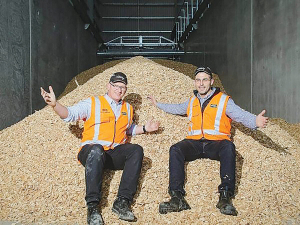Timaru: Land of diversity and opportunity
Scientists, farmers and agricultural industry representatives will be beating a path to Timaru in early November for the 78th New Zealand Grassland Association (NZGA) annual conference.
 McCain Timaru engineering project manager Lenard Smythe and plant manager Jordan Jurcina with woodchips that will be used to replace coal.
McCain Timaru engineering project manager Lenard Smythe and plant manager Jordan Jurcina with woodchips that will be used to replace coal.
McCain Foods Timaru plant is aiming to reduce its demand for heating fuel and CO2 emissions generated by burning coal.
The company says, in alignment with its objective of avoiding coal consumption by 2025, the Timaru French fries plant converted its coal-fired boiler to operate from domestically-sourced woodchips. McCain claims this will reduce its carbon emissions by around 30,000 tonnes per year.
Trials began in May 2021 with the Energy Efficiency and Conservation Authority (EECA) requirements to prove the concept, with final commissioning completed in June 2022.
McCain Foods engineering project manager Lenard Smythe says the initiative is a positive step forward and an opportunity for McCain to continue innovating to reduce its carbon footprint.
“It’s important for companies to take the initiative and lead the way when it comes to climate action. It’s in our best interest to save our environment and continually improve our practices to reduce our impact in terms of emissions,” he explains.
“The Boiler Conversion project is only one of many initiatives McCain is working on to achieve our sustainability targets.”
In recognition of the project meeting the Government’s sustainability objectives, McCain has been awarded GIDI (Government Investment in Decarbonising Industry) funding on a co-investment basis.
New Zealand will ban new coal boilers by 2022 and phase out existing coal boilers by 2037.
McCain Timaru says it is also focused on recovering waste heat from the fryer for use elsewhere in the facility.
This will further reduce total energy consumption by more than 37,000 GJ/year and reduce fuel consumption.
This will support the general site’s steam demand, which includes preheating boiler feed water and further cut the fuel required to fire the boilers.
Smythe says McCain Timaru will continue to innovate and work with industry and government to produce high quality products with less environmental impact.
New Zealand Police is urging rural property owners to remain vigilant and ensure their property is secure.
New Zealand and Malaysia have agreed to boost trade for high-quality halal meat products.
Convictions and fines totalling $112,500 have been imposed on a logging company for repeated environmental damage on a farm near Wahi between August 2022 and October 2023.
OPINION: Climate change is shaping up to be one of the major issues at next year's general election.
Horticulture New Zealand (HortNZ) and the Government will provide support to growers in the Nelson-Tasman region as they recover from a second round of severe flooding in two weeks.
Rural supply business PGG Wrightson Ltd has bought animal health products manufacturer Nexan Group for $20 million.